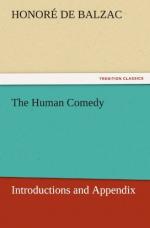This work, so far, was nothing. By adhering to the strict lines of a reproduction a writer might be a more or less faithful, and more or less successful, painter of types of humanity, a narrator of the dramas of private life, an archaeologist of social furniture, a cataloguer of professions, a registrar of good and evil; but to deserve the praise of which every artist must be ambitious, must I not also investigate the reasons or the cause of these social effects, detect the hidden sense of this vast assembly of figures, passions, and incidents? And finally, having sought—I will not say having found —this reason, this motive power, must I not reflect on first principles, and discover in what particulars societies approach or deviate from the eternal law of truth and beauty? In spite of the wide scope of the preliminaries, which might of themselves constitute a book, the work, to be complete, would need a conclusion. Thus depicted, society ought to bear in itself the reason of its working.
The law of the writer, in virtue of which he is a writer, and which I do not hesitate to say makes him the equal, or perhaps the superior, of the statesman, is his judgment, whatever it may be, on human affairs, and his absolute devotion to certain principles. Machiavelli, Hobbes, Bossuet, Leibnitz, Kant, Montesquieu, are the science which statesmen apply. “A writer ought to have settled opinions on morals and politics; he should regard himself as a tutor of men; for men need no masters to teach them to doubt,” says Bonald. I took these noble words as my guide long ago; they are the written law of the monarchical writer. And those who would confute me by my own words will find that they have misinterpreted some ironical phrase, or that they have turned against me a speech given to one of my actors—a trick peculiar to calumniators.
As to the intimate purpose, the soul of this work, these are the principles on which it is based.
Man is neither good nor bad; he is born with instincts and capabilities; society, far from depraving him, as Rousseau asserts, improves him, makes him better; but self-interest also develops his evil tendencies. Christianity, above all, Catholicism, being—as I have pointed out in the Country Doctor (le Medecin de Campagne)—a complete system for the repression of the depraved tendencies of man, is the most powerful element of social order.
In reading attentively the presentment of society cast, as it were, from the life, with all that is good and all that is bad in it, we learn this lesson—if thought, or if passion, which combines thought and feeling, is the vital social element, it is also its destructive element. In this respect social life is like the life of man. Nations live long only by moderating their vital energy. Teaching, or rather education, by religious bodies is the grand principle of life for nations, the only means of diminishing the sum of evil and increasing the sum of good in




